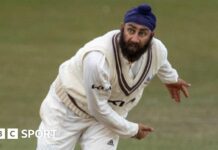With cricket bat in hand, few exceeded the mix of skill and tenacity shown by Graham Thorpe whenever he was called to the crease. They were the twin pillars of all his finest innings, including an unbeaten 64 that he made to secure the “win in the dark” over Pakistan at Karachi in 2000, one of England’s greatest victories overseas.
Thorpe often saved his best for a crisis, and this was one. Pakistan had never lost a Test match in that city, so tried everything to frustrate their opponents, including cynical time-wasting on the final afternoon. But the left-handed Thorpe kept his calm amid the squabbles and procrastinations, and with a sure but deft touch saw England home long after the city’s crows had returned to roost.
At the time Thorpe, who has died suddenly aged 55, made light of the challenge, not least of being able to see a small red ball in near darkness, the use of floodlights not being standard back then. “It was like playing for Wrecclesham in the Flora Doris Trophy,” he said afterwards, referring to an evening league in Surrey in which he had played as a teenager and where car headlights would sometimes illuminate the final overs.
Only 17 male cricketers have so far won 100 Test caps for England, and Thorpe, who made his 100th and final appearance against Bangladesh in 2005, was probably the least well known of them – which is probably how he liked it. Yet it should not, perhaps, have been that way, as he was arguably England’s best batter between David Gower and Kevin Pietersen, if very different from both in style and approach.
Resolute rather than flash, Thorpe valued dependability over artistry, which made him a popular teammate. Like another great left-hander, the Australian Allan Border, he had a stout defence with a few trusty shots that he stuck with. Not for him the thrill of the high-tariff switch hit or scoop.
He could be fiery, emotionally, with a tendency to brood over matters that others would let go – and he had several running spats with journalists. On one occasion he refused to conduct a press conference until one writer he had taken issue with had left the room. Yet, with bat in hand his focus was absolute and nothing could distract him.
Michael Vaughan was England captain for Thorpe’s final Test. With the Ashes due to be contested a few weeks later, Vaughan wanted players unscarred by previous encounters with Australia, who at that stage had held the Ashes for 16 years. So in came Pietersen and out went Thorpe, despite averaging 101 in his last three Tests. Vaughan backed bravado to trump experience, which it did when England won the series 2-1.
Graham Thorpe become a coach after retiring as a player. Photograph: Sarah Lee/The Guardian
To reach 100 Test caps, in addition to the 82 Thorpe won for England’s one-day team, demands a consistency of performance that separates the driven from the merely talented. Ever the thinker, Thorpe quickly worked out that if he was to thrive at international level he needed to be good against express pace and quality spin, two types of bowling not widely present in county cricket. He set his mind and practice regimes accordingly, even going as far as to deliberately roughen pitches in the nets so that they would turn, a habit that did not endear him to groundsmen.
His tally of 6,744 Test runs at an average of 44.66 with 16 hundreds suggests his plan succeeded. That, though, was just the cream of a fine career that also saw him clock up 17 years of county cricket for Surrey, with whom he won nine trophies, including three county championship titles.
It was against high calibre spin, on a pitch made to turn from the start, that Thorpe provided arguably his best Test contribution in 2001. He scored 113 and 32 against a strong Sri Lanka side that included Muttiah Muralitharan, the world record holder for Test wickets. In Colombo’s sapping heat and humidity he was not dismissed in either innings as England scraped home by four wickets. To underline his brilliance, the next highest score from the 17 other England batters to reach the crease was 26. For sheer skill those innings compare favourably to Graham Gooch’s unbeaten 154 against West Indies on a tricky pitch at Headingley in 1991.
Graham was born in Farnham, Surrey, to Toni and her husband, Geoff. He attended Weydon school in Farnham, where he gained six O-levels before completing a PE diploma at Farnham college.
He turned out for Wrecclesham cricket club and then, with his father and brothers, Ian and Alan, for Farnham, where his mother did the scoring. He also played football for Farnham Town boys, alongside his soon-to-be Surrey teammate Martin Bicknell. A talented midfielder, he impressed enough to be picked for the England Schools Under-15 team, and reckoned he was the only player in the squad not to have already signed to an elite club such as Chelsea or Arsenal. As Bicknell put it: “Growing up, Thorpey was simply the best cricketer and footballer in every age-group team.”
He joined Surrey in 1988 as an 18-year-old, making his first-class debut against Leicestershire the same year. In that match he batted at eight and bowled second change (right-arm medium). His maiden wicket was Gower, a fellow left-hander whom he admired greatly. Thorpe might have developed into a proper all-rounder but persistent back problems saw his bowling slide from useful to occasional.
His organised, unfussy batting soon caught the eye of Keith Fletcher, Essex’s former captain turned coach of the England A team, who insisted Thorpe be included on that team’s 1990 tour to Kenya and Zimbabwe. A shrewd judge of a player, Fletcher saw his instincts borne out when three years later Thorpe made his Test debut against Australia at Trent Bridge in 1993.
England fielded three other debutants that day – Mark Lathwell, Mark Ilott and Martin McCague – who went on to win 10 caps between them. Thorpe managed 10 times that many, making a hundred and winning the man-of-the-match award on his first outing.
Despite that fine start against Australia, he never played in an Ashes winning team, unlike the players immediately after him. Over the span of his 100 caps England won 38 Tests and lost 29, drawing the remainder. He played under five England Test captains, including his friend Nasser Hussain.
Following his retirement from cricket at the end of 2005 he began to coach, first with New South Wales in Australia and then Surrey 2nd XI. After that he became the national lead batting coach for the England and Wales Cricket Board, based at Loughborough, where his experience of top-level cricket, great knowledge about batting and communication skills made him a popular mentor. In 2006 he was appointed MBE for services to cricket. Later on he became England’s batting coach, a role from which he was sacked in early 2022 after repeated batting failures saw England lose the Ashes 4-0.
Not everyone found him an easygoing coach, as a young Ben Stokes discovered before he had played for England. Thorpe wanted a way, during practice, of curbing his charge’s headstrong excesses without crushing his spirit. His ploy centred on making Stokes sell his wicket more dearly, which he achieved by making the player leave the net every time he got out. Stokes would then have to remove all his batting gear and put it on again before being allowed to resume. The penny soon dropped when Stokes spent most of his 20-minute slot buckling and unbuckling his pads.
In 1995 Thorpe married Nicola McDowell, with whom he had a son, Henry, and a daughter, Amelia. The marriage ended in divorce. With his second wife, Amanda (nee Duncan), he had a daughter, Emma, and a stepdaughter, Kitty. Amanda and his children survive him, as does his father.
Graham Paul Thorpe, cricketer, born 1 August 1969; death announced 5 August 2024
Source link : https://www.theguardian.com/global/2024/aug/05/graham-thorpe-obituary
Author :
Publish date : 2024-08-05 17:59:11
Copyright for syndicated content belongs to the linked Source.





















































